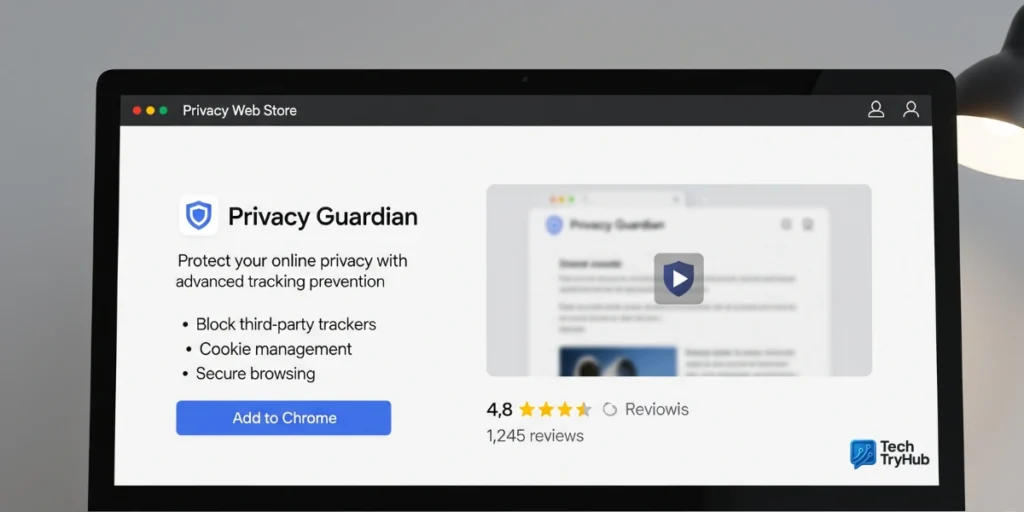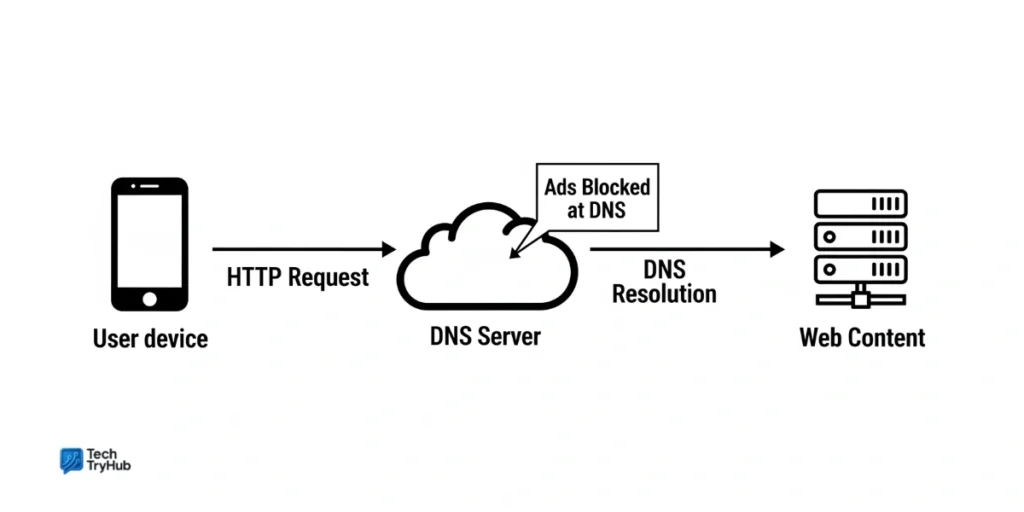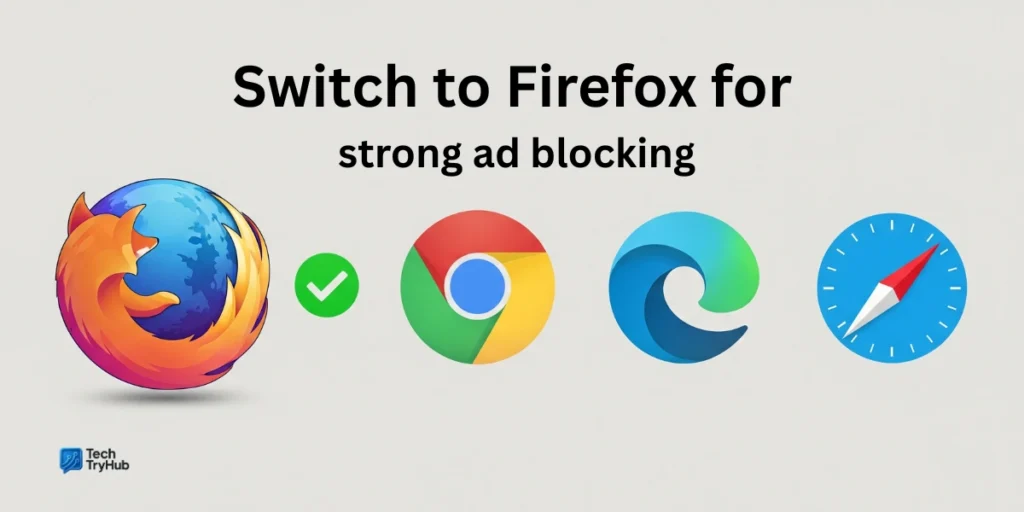Introduction the two-minute story
You opened Chrome, hit play on YouTube, and the ad… didn’t skip.
Your favorite blocker, uBlock Origin, looks grayed out.
And every page suddenly feels heavier.
If you’re asking “what is a good replacement for uBlock Origin Chrome?” you’re not alone. In 2025, Chrome’s shift to Manifest V3 has limited the old way many extensions block ads (the WebRequest API). That’s why classic uBlock Origin is being phased out on Chrome, with a staged disablement that began in early 2025. Google’s published timeline confirms that Manifest V2 extensions have been disabled by default, with the stricter phase rolling out after March 31, 2025.
So what should you install now? Is uBlock Origin Lite enough? Should you add DNS-level blocking? Or is it time to switch browsers?
This guide gives you practical choices ranked by reliability, privacy, and ease of use so you spend less time tinkering and more time browsing.
TL;DR your best options right now
- Fastest drop-in: uBlock Origin Lite (MV3-compliant, simple rules; fewer “power-user” controls than classic uBO).
- Stronger protection across devices: AdGuard (extension + optional AdGuard DNS for system-wide blocking).
- Tracker transparency: Ghostery (great UI for understanding who’s tracking you).
- Easy, mainstream option: Adblock Plus (familiar, simple; allows some “acceptable ads” by default).
- Privacy-first complement: Privacy Badger (behavior-based tracker blocker; pair it with a filter-list blocker).
- Browser switch for full power: Firefox continues to support the blocking WebRequest capability in MV3, preserving heavy-duty content blocking.
Why uBlock Origin changed on Chrome

Context. Chrome moved from Manifest V2 to Manifest V3. MV3 limits how extensions can intercept and block network requests. That’s a big deal because classic uBlock Origin relies on the older, more flexible approach. Windows Central’s February 2025 explainer captured what many users saw: uBlock Origin began turning off for some Chrome users as the cutoff rolled out.
Key point. The shift reduces what list-based blockers can do inside Chrome. MV3’s declarativeNetRequest is safer in some ways, but also more limited for power filtering. Mozilla summed up its different approach in an official post: it will “maintain support for blocking WebRequest in MV3” which is why Firefox keeps full-strength content blocking working.
Actionable insight: If you want the “old uBO feel,” Firefox gives you the least compromise. If you’re sticking with Chrome, pick one of the replacements below.
Key takeaways:
- MV3 limits classic network-level blocking inside Chrome.
- Firefox keeps the stronger blocking model.
- On Chrome, you’ll likely combine an MV3 blocker with DNS-level filtering for best results.
The best replacements for uBlock Origin on Chrome (2025)
1) uBlock Origin Lite (MV3) the quickest fix
What it is: A lighter, MV3-compatible version from the uBO project. It uses MV3 rules to block ads/tracking without full WebRequest control.
Why choose it:
- One-click install from the Chrome Web Store.
- Zero-config basics; solid for most sites.
- Actively maintained by the uBO community.
Trade-offs:
- Fewer advanced features than classic uBO (dynamic filtering, advanced scripting rules).
- For stubborn platforms (like some YouTube scenarios), you may still see ads unless you add DNS-level help. (YouTube often serves ads from the same domains as content.)
Mini-summary: Start here if you need something simple that respects Chrome’s MV3 rules.
Key takeaways:
- Fast, MV3-compliant drop-in.
- Lacks some “power-user” controls.
- Pair with DNS-level blocking for harder cases.
2) AdGuard (Extension + DNS) stronger, system-wide coverage

What it is: A well-known ad-blocking suite. On Chrome, you can use AdGuard Extension plus AdGuard DNS to filter ads on devices and apps beyond the browser.
Why choose it:
- DNS-level blocking catches many ads/tracking requests before they even reach Chrome.
- Works across all apps and browsers on the device (great for mobile or multiple browsers).
- Supports encrypted DNS (DoH/DoT/DoQ) and curated filters.
Trade-offs:
- DNS blocking can’t surgically remove every ad (e.g., YouTube’s ads come from Google domains you can’t simply block without collateral damage).
- Paid tiers if you want advanced features.
Mini-summary: If you want “good enough everywhere”beyond just Chrome AdGuard + DNS is practical and effective.
Key takeaways:
- System-wide filtering complements MV3 blockers.
- Encrypted DNS improves privacy.
- YouTube ads remain tricky at DNS level.
3) Ghostery excellent tracker visibility with sane defaults
What it is: A popular privacy extension that blocks trackers and shows you, in plain English, who’s tracking you on a page.
Why choose it:
- Friendly UI with real-time tracker insights.
- Good balance of blocking and breakage prevention.
- Helpful for users who want to learn and fine-tune.
Trade-offs:
- Not as granular as classic uBO for advanced custom rules.
- You may still want a DNS helper for system-wide blocking.
Mini-summary: Great for users who want clarity and control without a learning curve.
Key takeaways:
- Transparent tracker reporting.
- Easy to use; add DNS for broader coverage.
4) Adblock Plus a familiar, simple option
What it is: One of the oldest ad blockers. Easy onboarding, huge user base, and reasonable performance under MV3 constraints.
Why choose it:
- Comfortable for most users; quick setup.
- Whitelisting/“acceptable ads” can be toggled off if you prefer stricter blocking.
Trade-offs:
- Defaults may allow some ads (you can disable this).
- Doesn’t match classic uBO’s finesse for niche cases.
Mini-summary: Good enough for many users who value simplicity over power.
Key takeaways:
- Easy install; mainstream choice.
- Check settings if you want stricter blocking.
5) Privacy Badger behavior-based tracker blocking
What it is: An EFF tool that learns which domains track you and blocks them no big filter lists required. Best as a companion.
Why choose it:
- Strong on privacy; auto-learns trackers.
- Great complement to any of the above blockers.
Trade-offs:
- Not designed to replace a list-based ad blocker on its own.
- May need time to learn your browsing patterns.
Mini-summary: Pair it with uBO Lite, Ghostery, or ABP for extra privacy muscle.
Key takeaways:
- Behavior-based protection (not just lists).
- Best as a second layer.
Comparison table (Chrome users, 2025)
| Option | Type | Strengths | Limitations | Best for |
|---|---|---|---|---|
| uBlock Origin Lite | MV3 extension | Easy, fast, well-maintained | Fewer power features than classic uBO | Quick, no-fuss replacement. |
| AdGuard + DNS | Extension + DNS | System-wide filtering; encrypted DNS | DNS can’t cleanly block YouTube ads | Cross-device protection. |
| Ghostery | Extension | Clear tracker insights; good defaults | Not as granular as uBO | Privacy learners/visual thinkers. |
| Adblock Plus | Extension | Familiar, simple, huge community | Acceptable ads on by default | Non-technical users. |
| Privacy Badger | Extension | Behavior-based tracker blocking | Not a full ad-block list | Companion privacy layer. |
Key takeaways:
- Combine one MV3 blocker + DNS filtering for best coverage.
- Expect trade-offs on YouTube due to domain overlap.
Should you switch browsers instead?

Here’s the honest answer: If you want the “classic uBO” power, switch browsers.
Firefox will continue to support the stronger blocking WebRequest capability in its MV3 implementation, specifically to keep content blockers viable. Even Windows Central recommends Firefox as the safest bet for people who rely on robust blocking.
If you’re Chrome-loyal, the best Chrome stack is:
- uBlock Origin Lite
- + AdGuard DNS (or another privacy DNS)
- Optional: Privacy Badger for behavior-based tracking
Key takeaways:
- For full power, Firefox is the path of least resistance.
- On Chrome, use a stack to compensate.
Real-world setup (10 minutes)
- Install uBlock Origin Lite from the Chrome Web Store.
- Set up AdGuard DNS on your device or router (DoH/DoT).
- (Optional) Add Privacy Badger for extra tracking defenses.
- Whitelist your favorite sites to support creators you trust.
- Test results with tools like adblock-tester.com, Cover Your Tracks, or Can You Block It to confirm improvements (these are common third-party tests referenced by reputable reviews).
Key takeaways:
- You can match much of uBO’s feel on Chrome with a layered setup.
- Always test and adjust for your browsing habits.
Important facts most lists don’t mention
- DNS limits on YouTube: DNS filters can’t neatly block YouTube ads because they share core Google domains; don’t expect miracles at that layer.
- Firefox’s explicit stance: Firefox publicly committed to keeping blocking WebRequest viable in MV3 this is not a rumor; it’s in their engineering posts.
- Microsoft Edge timeline ambiguity: Edge also moves to MV3; exact disable dates for MV2 can differ, and Microsoft’s guidance focuses on migration best practices, not exact consumer deadlines.
Expert quotes short & useful (what is a good replacement for ublock origin chrome)
- Mozilla (official statement): “Mozilla will maintain support for blocking WebRequest in MV3.” (Context from Mozilla’s add-ons team updates.)
- Windows Central (Feb 25, 2025): Chrome’s MV3 shift is already disabling uBlock Origin for users as the rollout continues.
Conclusion: What is a good replacement for ublock origin chrome
If you want a no-drama fix on Chrome, install uBlock Origin Lite and add AdGuard DNS. If you want the closest experience to classic uBO especially for complex filtering switch to Firefox. That’s the cleanest path right now, and it’s backed by the browser vendor’s own MV3 stance.
Want more help? Check our Manifest V3 guide and the ad-block testing toolkit to verify your setup and keep pages clean without breaking sites.
Your web should feel calm again. Start with one change today.
FAQs: (What is a good replacement for ublock origin chrome)
1) What is a good replacement for uBlock Origin on Chrome?
Try uBlock Origin Lite for a quick fix, and add AdGuard DNS for system-wide filtering. For maximum power, consider Firefox, which retains stronger blocking capabilities than Chrome’s MV3 allows.
2) Is uBlock Origin Lite as good as the original?
It’s solid for most people but less granular than classic uBO. That’s an MV3 limitation. Pair it with DNS filtering to get closer to the old experience.
3) Can DNS blockers remove all YouTube ads?
No. YouTube ads often arrive from the same Google domains as the video, so blocking them at DNS breaks YouTube itself. Use an MV3 blocker plus DNS for better—but not perfect results.
4) Is switching to Firefox worth it just for ad blocking?
If ad blocking is critical, yes. Firefox keeps the blocking WebRequest capability, so advanced filter-based extensions work more like they used to.
5) Does Adblock Plus still work on Chrome?
Yes. It’s MV3-compatible with simple controls. Check settings to disable “acceptable ads” if you want stricter blocking.
6) Is Privacy Badger enough by itself?
It’s best as a companion. It learns and blocks trackers based on behavior; pair it with an MV3 blocker for full coverage.
7) What about Edge or Brave?
Edge is migrating with Chrome to MV3. Brave has built-in blocking, but if you want the least compromise with heavy filter lists, Firefox remains the most aligned with classic uBO-style blocking.